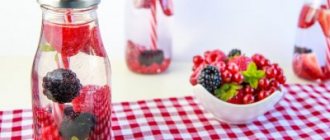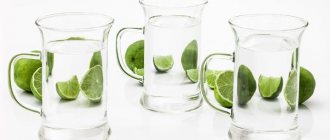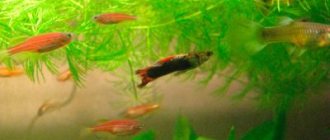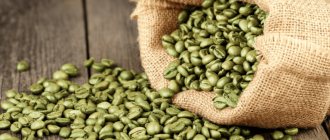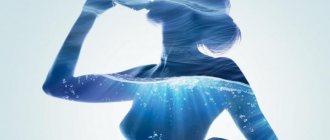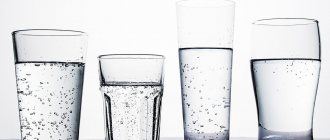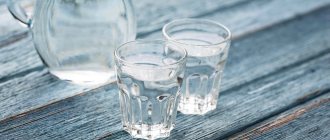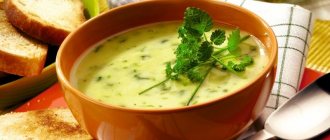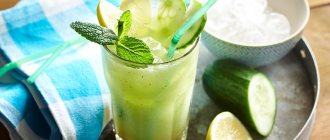Everyone knows that you need to drink clean water throughout the day to maintain water-salt balance in the body. For the forgetful and busy, there are even special applications that give a signal several times a day: get up and go to the cooler. And we go... But sometimes, instead of tasteless water, we pour ourselves aromatic tea or brew strong coffee...
However, are such drinks considered liquids? Or, on the contrary, do they remove moisture from the body and you need to replenish what is lost twice as much? If you are also trying to figure this out and watch your drinking regime, our article is for you.
Water in the body
Before we talk about the benefits of water for the body, let’s give statistics on how much water is in the human body:
- Brain – 95%;
- Lungs – 90%;
- Blood – 82%;
- Bones – 25%;
- Muscles – 70%;
- Fat – 10-20%.
Liquid is involved in all processes occurring in the body. It improves digestion, removes harmful substances and carries out general detoxification. Water also helps maintain skin tone.
Why drink at all if you don’t feel like drinking?
Let’s not turn into a biology textbook, let’s just say that water performs the most important functions in our body (which, by the way, consists of 60% water): it delivers useful substances to cells, removes toxins and waste from the body, normalizes the functioning of all organs, supplies oxygen to the brain, prevents the earlier appearance of wrinkles and premature aging of the body, and so on.
By the way, if you are thirsty, this can already be considered an SOS signal: it means that the brain has decided that you are dehydrated. Therefore, you need to drink a little during the day so as not to miss the moment when the body begins to lack moisture. However, too much water is also unhealthy. Despite the fact that the kidneys of a healthy person are capable of filtering up to 20 liters per day, excessive load will only harm them.
The benefits of water for the body
It is imperative to drink water; it brings many benefits to the body. Among the beneficial properties of water:
- Only water can be considered water. It is this that prevents dehydration of the body by saturating it with necessary moisture. Coffee, tea and other drinks have a diuretic effect, so they are quickly eliminated and do not provide enough moisture.
- Water helps fight excess weight. The first reason is that it does not have the same calories as the nutritious drinks with which we often replace it. The second reason is that water suppresses appetite. The third reason is that water has an anti-edematous effect, and when the swelling goes down, the weight also decreases. Therefore, those who are losing weight are advised to drink water rather than tea in large quantities.
- Drinking enough water improves heart function. People who drink 6 glasses of water a day are less likely to have attacks. So drink 3 glasses a day at least.
- Water gives energy. Even when the body is only 1-2% dehydrated, a person begins to feel tired. If you are thirsty, drink water, this is one of the signals of dehydration. Water will give you a lot of energy, a boost of vigor and strength.
- Water helps fight headaches. Headache is one of the signs of dehydration. Sometimes drinking water is enough to make the headache go away. Although there may be other reasons.
- Water improves skin condition. If you drink a lot of water, your skin becomes clearer. You will notice a difference if you make a habit of drinking 3-6 glasses a day. No cosmetic products will help you if you drink little water.
- Water helps proper digestion. The human digestive system requires a lot of water to function properly. Water can greatly help fight high stomach acidity. It also promotes faster absorption of food. And dehydration can cause constipation.
- Water cleanses the body. Water removes toxins and various harmful substances. Most of the waste is concentrated in the intercellular fluid. If you drink slightly alkaline water, where the ORP is negative, the toxins are cleaned out.
- Water promotes athletic performance. Dehydration means fatigue. Consequently, it interferes with normal sports activities. Due to fatigue, you cannot cope with stress, which can cause injuries. Drink a couple of glasses of slightly alkaline water before starting your workout to boost your energy for the sport.
You may be interested in: Review of New Year's tea sets
How many liters should you drink?
From 1.5 to 3 liters - this is how much fluid, according to doctors, each of us should consume per day. Classic calculation system: 30 ml per 1 kilogram of weight, or the notorious “8 glasses”. This is the required minimum. However, in hot weather, during the heating season, as well as during intense physical activity, you need to drink an additional 2-3 glasses (for this it is convenient to keep a water bottle with you). Of course, all these are average figures, because a lot depends on the health status of a particular person, his age, lifestyle and even gender. One thing is important - you need to drink! But what exactly?
How much water should you drink?
Relying only on thirst, asking yourself how much water you need, is not worth it. Thirst occurs when dehydrated. If you drink plenty of water, this process can be prevented.
You need to drink enough to compensate for the loss of natural fluids.
It is not recommended to mix water with food. Water consumption during meals should be reduced to 200 ml. Drink in small sips without washing down your lunch. And you certainly shouldn’t replace water with a huge bottle of cola or a mug of tea.
The reason is this: the stomach needs to produce enough acid to have time to digest all the proteins received and absorb minerals. If you consume too much liquid while eating, your stomach will not be able to function properly, which will increase energy costs and disrupt the digestion process. It is best to drink 30 minutes before or after meals. You should also drink 250 ml of water between meals.
On average, doctors recommend drinking about 2 liters of fluid per day. 75% of the total volume of liquid consumed should be water. You need to drink even more in the following cases:
- Hot weather;
- Stuffiness in the room;
- Sports activities;
- Consumption of large amounts of sweets and coffee.
It is recommended to consume the main volume of water before 15 hours. After 19.00. The volume of water drunk should be no more than 500 ml. The issue of drinking water should really be taken very seriously, since it plays a big role in the functioning of all tissues of the body.
“I drank coffee, wash it down with a glass of water!”
Have you heard this phrase? It is believed that caffeine (which is found in both coffee and tea) acts as a diuretic, and therefore dehydrates the body. This means that after a cup of espresso and a mug of strong green or black tea, you need to drink the same amount of clean water.
What really?
Let us immediately make a reservation that there are no large, long-term and detailed studies on the diuretic effect of tea and coffee on the body. About a dozen short-term experiments, the results of which were published in various scientific and popular publications, mainly relate directly to caffeine, while tea and coffee contain many other chemical compounds! However, this was enough to give rise to myths around our favorite drinks.
The buzz about caffeine's diuretic properties began in 1928, almost a century ago. Then only three (!) men took part in it. The participants in the experiment drank either tea or coffee, sometimes only water, and sometimes even water with pure caffeine added to it. Scientists who monitored their condition found that the diuretic effect of “caffeine drinks” actually occurred. But short-term and only if the subjects had not consumed tea or coffee at all for two months before.
A similar experiment was conducted in 2005, but on 59 healthy people. It lasted 11 days, during which scientists came to a similar conclusion: the human body, not accustomed to caffeine, reacts by releasing a larger amount of liquid than usual, but quickly adapts to the mild diuretic effect of the substance after 4–5 days.
Other experiments with different dosages of caffeine only confirmed the results of the previous ones: after a long break, tea and coffee can act as diuretics, but this will not lead to dehydration. And people who constantly treat themselves to a cup or two of Americano, cappuccino or, say, matcha will not feel any effect at all.
We have sorted out the removal of water from the body. What about its absorption?
The good news is that a 2014 study found that moderate amounts of caffeine, as well as low-caffeine drinks, are as hydrating as water. Moreover, during the experiment, the male subjects drank about 800 ml of coffee per day - this, you see, is not so little! That is, a healthy person who regularly drinks tea or coffee can equate these drinks to water
.
Consequences of dehydration
The first consequence of dehydration is a decrease in mental and physical activity. When moisture levels drop by even 4-5%, activity levels drop by 20-30%. Dehydration of 10% is already a direct threat to health. And with dehydration of 2%, the following symptoms may occur:
- Fatigue;
- Decreased concentration;
- Difficulty reading small print;
- Decreased physical performance;
- Deterioration of short-term memory.
You may be interested in: Herbal tea: a source of health and well-being
Water is the main component of cells, organs and tissues. It acts as a conductor for nutrients that are transported through the blood. Water also produces saliva, which is necessary for digestion. Water also forms the fluids surrounding the joints and is involved in maintaining the following processes:
- Acid-base balance;
- Body temperature;
- Breath;
- Metabolism;
- Circulation of various substances;
- Blood circulation;
- Neurological processes;
- Excretory functions.
Is it possible to replace water with tea?
You cannot drink tea instead of water, as it is unable to become a full replacement for it. All drinks have different effects on the body, both positive and negative. Therapeutic fasting methods are also only possible using water, not tea or coffee, otherwise it will be considered a diet.
Reasons why you should not drink tea instead of water:
- after tea, a certain aftertaste and a feeling of dryness remain in the mouth, which can be eliminated with a sip of clean water;
- you won’t be able to quench your thirst with tea instead of water;
- tea washes out calcium, so you can’t drink it uncontrollably, you need to follow a certain dosage.
The cells of our body are 70% water, so these reserves need to be replenished daily. And tea, firstly, by its nature, flushes out excess fluid, and secondly, a person loses even more water due to increased sweating due to a hot drink. A cup of tea is unable to restore the water balance of our body.
Dehydration and illness
Scientists and some doctors believe that chronic dehydration can cause various diseases. The nature of the disease depends on the degree of dehydration - mild, moderate or severe. Statistics say that about 75% of people drink little water. And to improve their well-being, they sometimes just need to increase their consumption. The greatest statistics in improving processes in the body by restoring the water-alkaline balance are in such areas of medicine as clinical medicine and pediatrics. There are a number of symptoms and diseases that dehydration causes that can be eliminated by restoring the water-alkaline balance:
- Heartburn;
- Arthritis;
- Pain in the chest and lower back;
- Migraine;
- Colitis;
- High pressure
- Asthma;
- High cholesterol;
- Muscle pain.
Please note that simply drinking large amounts of water is unlikely to completely cure your condition. If any of these symptoms occur, consult your doctor. Consume more water, take it with you in a bottle and try to drink at least 2 liters of water per day, replacing other drinks with it as much as possible.
Not instead, but together
In general, you have already realized that even if you don’t drink water at all, but still consume fruits, vegetables, soups, juices, as well as your favorite tea and coffee, you definitely won’t die from dehydration. Coffee and tea, of course, are liquid, but drinking a glass of water after a cup of espresso certainly won’t make it worse. Drinking water is a generally good habit: for example, it can help refresh your receptors and sharpen your sense of taste after a sip of a very strong ristretto. We ourselves prefer to drink such drinks for pleasure, and water to quench our thirst, so as not to drive ourselves into neurosis by strictly counting “8 glasses.”
What about lemon water?
Legends are made about lemon water, calling it an ideal remedy for strengthening the immune system, losing weight and beautiful skin due to its high content of vitamin C. Although lemons do contain vitamin C, it is not necessary to get it with water. Citrus fruits, strawberries and leafy green vegetables will do the job just as well.
Lemon water is generally safe to drink, but if you have stomach problems, don't indulge in it. Citric acid can also damage tooth enamel, so drink this water through a straw.
